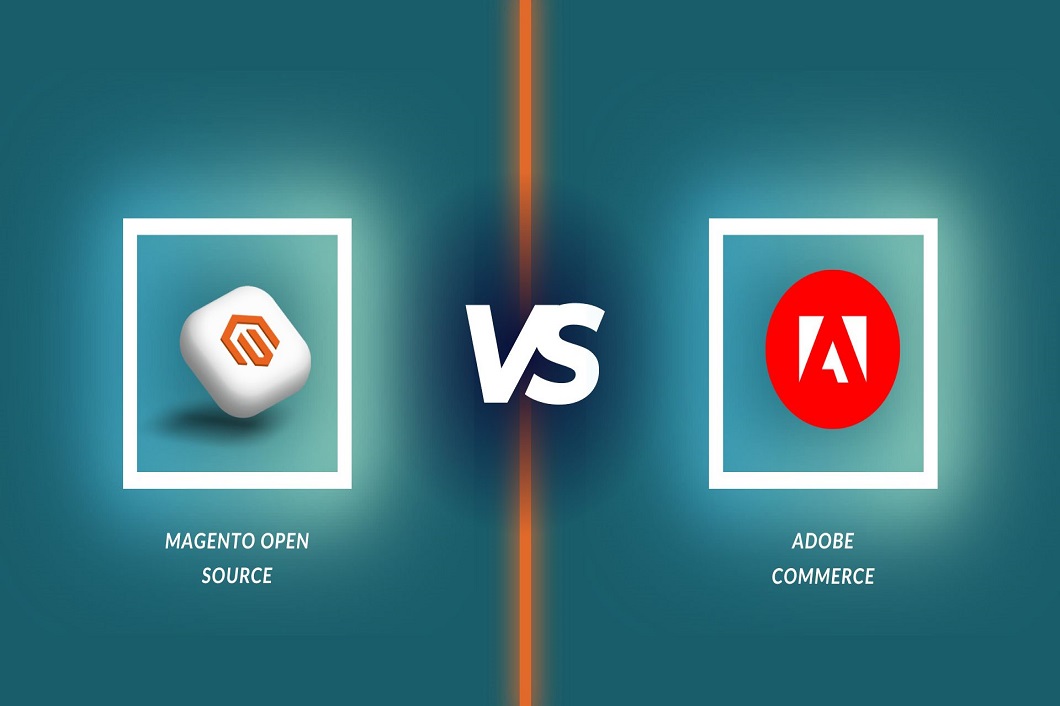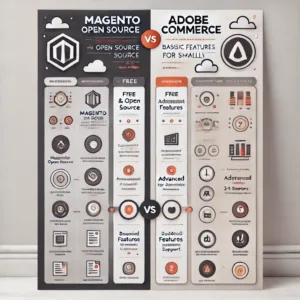
Deciding between Magento Open Source and Adobe Commerce (formerly Magento Commerce) for your online store can be a bit overwhelming. Both platforms share the same foundational codebase and offer essential eCommerce features like scalability and flexibility. However, they are tailored to meet different business needs, which can make the choice tricky.
This blog will guide you through the key differences between these two platforms, helping you decide which one best suits your business requirements.
Let’s begin with a brief overview of each platform before diving into a more detailed comparison.
Magento Open Source vs Adobe Commerce — A Quick Overview
What is Magento Open Source?
Magento Open Source is a free, open-source eCommerce platform designed for businesses that want to build highly customizable online stores. Previously known as Magento 2 Community Edition, it powers approximately 15% of the world’s eCommerce websites, making it a popular choice among businesses looking to tailor their store’s features and functionality to their specific needs.
While it offers a great deal of flexibility, Magento Open Source requires technical expertise to handle customization, hosting, and backend operations. It benefits from a large community of developers who can provide support, but official customer support is limited to documentation. To access more advanced features or improved hosting, you often need to rely on third-party extensions and integrations.
Magento Open Source is a great fit for businesses with technical resources that are looking for a flexible, customizable solution. However, it’s less suitable for those who need a more comprehensive, out-of-the-box solution.
What is Adobe Commerce?
Adobe Commerce (formerly known as Magento Commerce) is a premium, subscription-based platform designed for larger businesses and enterprises. It offers everything that Magento Open Source does but with additional out-of-the-box features, advanced scalability, and seamless integration capabilities.
Adobe Commerce is especially suitable for businesses that need more robust tools to manage high traffic, large product catalogs, and complex business operations. It includes features such as quick ordering, online quote processing, corporate account management, personalized pricing and catalogs, and comprehensive B2B functionality.
One of the biggest advantages of Adobe Commerce is its inclusion of Adobe Commerce Cloud, which offers enterprise-grade hosting, automatic security updates, and 24/7 dedicated support. This makes it an excellent choice for companies looking to scale and grow without having to worry about the complexities of managing infrastructure or handling technical support themselves.
Magento Open Source vs Adobe Commerce: Key Differences

When evaluating eCommerce platforms, it’s important to understand the key differences between Magento Open Source and Adobe Commerce. Both platforms are highly capable, but Adobe Commerce provides several advanced features that may be more suited for businesses looking to scale, secure their data, and optimize their digital commerce strategy.
1. Security Enhancements
Both Magento Open Source and Adobe Commerce offer strong security foundations, but Adobe Commerce takes it a step further:
- Magento Open Source: Provides essential security features like Google reCAPTCHA, two-factor authentication, and strong password requirements.
- Adobe Commerce: Offers additional enterprise-level security, such as 256-bit encryption, PCI compliance, and a Fastly Web Application Firewall. If you’re using Adobe Commerce on Cloud, you also benefit from a read-only production filesystem and a 99.9% SLA uptime, alongside additional monitoring and management features for added protection.
2. Managed Cloud Infrastructure & Business Tools
Adobe Commerce on Cloud offers a fully managed hosting solution, removing the burden of handling hosting costs and maintenance:
- Magento Open Source: Requires you to manage your hosting and infrastructure, which can be resource-intensive.
- Adobe Commerce: Provides high-performance hosting and CDN powered by Fastly, hosted on global infrastructures like AWS and Azure. With a 99.9% SLA uptime, Adobe Commerce ensures better scalability, speed, and reliability. It also includes tools like automated backups, scheduled data imports, and content staging, which make it easier to focus on business growth without worrying about the technical side.
3. Scalability & Performance
When it comes to handling growing traffic and scaling your business, Adobe Commerce has a more robust infrastructure:
- Magento Open Source: While it can be scaled manually, you’ll need to manage the infrastructure on your own.
- Adobe Commerce: Built with scalability in mind, Adobe Commerce handles high-traffic periods seamlessly with AWS-based infrastructure, high-performance CDN, and surge capacity monitoring. Adobe’s updates to the GraphQL API also improve response times, making the overall shopping experience more fluid.
For businesses expecting large-scale operations or frequent traffic spikes, Adobe Commerce provides a more reliable solution.
4. Commerce Intelligence
Adobe Commerce provides more advanced analytics and insights:
- Magento Open Source: Includes basic reporting and analytics, suitable for smaller-scale businesses.
- Adobe Commerce: Offers customizable dashboards, real-time insights, and over 75 reports to help you track KPIs and customer behavior. This is ideal for businesses looking to fine-tune their store and marketing strategies for better results.
These advanced features give businesses valuable data to create personalized experiences and improve conversions.
5. B2B Functionality
Both platforms can support B2B, but Adobe Commerce comes with built-in features:
- Magento Open Source: Requires custom development or third-party extensions to support B2B operations.
- Adobe Commerce: Includes advanced B2B features like custom catalogs and pricing, quick reordering, purchase approval workflows, and role-based permissions, providing a more seamless experience for B2B businesses.
If you’re running both B2B and B2C operations, Adobe Commerce offers a more integrated solution out of the box.
6. Marketing & Merchandising
Adobe Commerce offers more advanced marketing features compared to Magento Open Source:
- Magento Open Source: Provides basic marketing tools like rules-based recommendations, promotions, and SEO features.
- Adobe Commerce: Includes powerful tools like Adobe Sensei AI for product recommendations, AI-driven merchandising, live search, and automated abandoned cart recovery. These features help improve customer experience, increase conversions, and drive repeat business by offering more personalized product suggestions.
7. Advanced Segmentation & Targeting
Segmentation capabilities are more advanced in Adobe Commerce:
- Magento Open Source: Provides basic customer group segmentation.
- Adobe Commerce: Allows for more detailed segmentation based on customer behaviors, order history, and shopping cart contents. Features like Segmentation IQ, powered by machine learning, help uncover high-value customer segments to better target your marketing efforts.
With these capabilities, Adobe Commerce allows businesses to adjust marketing strategies based on changing market conditions and customer needs.
8. AI-Powered Features
Adobe Commerce integrates AI-powered tools across its platform, enhancing the shopping experience:
- Magento Open Source: Does not have integrated AI features out of the box.
- Adobe Commerce: Includes tools like Live Search, which uses AI to dynamically adjust search results based on shopper behavior, and Product Recommendations, which personalizes suggestions based on past purchases and browsing habits.
These AI features can significantly improve conversion rates by helping customers find products they’re more likely to purchase.
9. Technical Support
While Magento Open Source benefits from a strong community, Adobe Commerce offers professional, dedicated support:
- Magento Open Source: Relies on community forums and documentation for support.
- Adobe Commerce: Provides access to 24/7 expert support, including technical account management, with quicker response times and guaranteed SLAs. Adobe Commerce’s managed services also include premium support for complex issues, ensuring faster incident resolution.
This level of dedicated support can be a game-changer for businesses that need quick and reliable assistance.
10. Developer Tools
Adobe Commerce offers more developer-friendly tools that enhance flexibility and customization:
- Magento Open Source: Provides a wide range of tools for customization, but requires more hands-on management from developers.
- Adobe Commerce: Supports a composable commerce approach with tools like App Builder and robust API coverage for custom integrations. Features such as webhooks and event-driven integrations also provide developers with granular control.
These developer tools streamline the process of building and maintaining custom solutions, making it easier for businesses to adapt to changing needs.
Pricing Factors to Consider: Magento Open Source vs Adobe Commerce
When choosing between Magento Open Source and Adobe Commerce, it’s important to understand the key factors that influence pricing. While both platforms offer powerful eCommerce capabilities, the costs associated with each can vary depending on your business needs and scale.
Magento Open Source
Magento Open Source is free to use, but there are several factors that contribute to the total cost of ownership. These include hosting, development, third-party extensions, themes, and ongoing marketing efforts. Your specific needs and the level of customization you require will determine the overall cost.
Adobe Commerce
Adobe Commerce follows a subscription-based pricing model, which is based on factors like Gross Merchandise Value (GMV) and Average Order Value (AOV). This means that costs are scalable, and growing with your business. Licensing fees, hosting, development, and integrations will all affect the total investment.
Key Pricing Factors to Consider
- Hosting: Choose a hosting solution that meets your performance and security requirements.
- Customization & Development: Tailoring your store’s features and functionality can affect costs.
- Extensions & Themes: These add-ons enhance functionality and design, influencing overall pricing.
- Marketing & SEO: Effective campaigns to drive traffic and optimize conversions.
- Payment Processing Fees: Fees associated with transaction processing and payment gateways.
By understanding these pricing factors, you can choose the platform that best suits your business and budget. Contact DotcomWeavers to explore your options and get expert guidance.
Magento Open Source vs Adobe Commerce: A Feature Comparison
To give you a clearer view of how Magento Open Source and Adobe Commerce differ, we’ve created a side-by-side comparison. This table breaks down key features of both platforms, so you can easily see how they match up in areas like store management, performance, and support options.
| Feature | Magento Open Source | Adobe Commerce |
|---|---|---|
| Multiple Stores | Yes | Yes |
| Multiple Currencies | Yes | Yes |
| Multiple Languages | Yes | Yes |
| Tax Management | Yes | Yes |
| Gift Card | No | Yes |
| Price Management Tools | Yes | Yes |
| Order Management Tools | Yes (except store credit & archive) | Column 3 Value 7 |
| Navigation Tools | Yes | Yes |
| Multiple Payment Options | Yes | Yes |
| Shipping Options | Yes | Yes |
| SEO Tools | Yes | Yes |
| User Experience Tools | Yes | Yes |
| B2B Features | No | Yes |
| Reports | Yes | Yes |
| Performance Tools | Yes | Yes |
| Fastly Integration | Yes | Yes |
| Support | Yes | Yes |
| Customer Segments | Yes | Yes |
| Related, Cross-Sell, Upsell Products | Yes | No |
After reviewing this comparison, you should have a better understanding of how Magento Open Source and Adobe Commerce measure up to your specific needs.
In conclusion, choosing between Magento Open Source and Adobe Commerce depends on your business needs. If you’re looking for a cost-effective, customizable solution with the flexibility to scale, Magento Open Source is a great choice. However, for enterprises that require advanced features, high-level security, and managed hosting, Adobe Commerce offers a more comprehensive package.
DotcomWeavers: Helping You Choose the Right Platform
At DotcomWeavers, we understand that choosing the right eCommerce platform is crucial for your business. Whether you need the flexibility of Magento Open Source or the robust features of Adobe Commerce, we provide tailored solutions to fit your unique business size, needs, and budget. As a Gold Adobe Partner, we offer expert consulting, development, and integration services to ensure your online store thrives on whichever platform you choose.
Our Expertise:
- Magento Open Source Development: We specialize in cost-effective, customizable eCommerce solutions, offering full-stack development, theme design, and seamless integration services to bring your vision to life.
- Adobe Commerce Implementation: For larger enterprises, we provide end-to-end Adobe Commerce solutions, leveraging enterprise-grade infrastructure, advanced B2B features, and AI-powered tools to elevate the customer experience.
Tailored eCommerce Solutions: Real-World Success Stories
Magento Open Source:
- Wayne Tile: A custom eCommerce solution built with Magento Open Source, designed to support Wayne Tile’s growth while offering flexibility in both design and functionality.
- Pump Products: Built on Magento Open Source, Pump Products streamlined their product catalog management and enhanced the shopping experience, offering flexibility and efficiency as they cater to the pump supply industry.
Adobe Commerce:
- Whiz-Q: A large-scale solution powered by Adobe Commerce, featuring B2B functionality, ERP integration, and top-tier security to drive growth in the stone and landscape materials market.
- Echo USA: A robust Adobe Commerce platform integrated with ERP systems, designed to handle high-volume transactions and complex product catalogs with advanced security measures.
Whether you’re looking for a flexible solution with Magento Open Source or a powerful, enterprise-level platform with Adobe Commerce, DotcomWeavers is ready to guide you toward the best option for your business.
Receive a Personalized Consultation for Your eCommerce Requirements!
Receive a Personalized Consultation for Your eCommerce Requirements!
